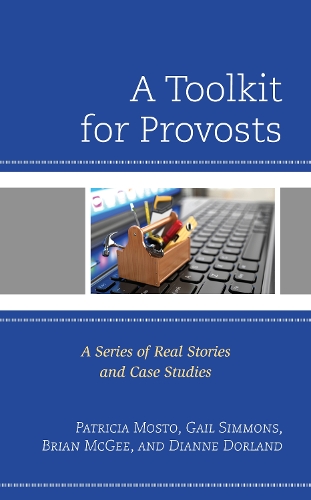
A Toolkit for Provosts: A Series of Real Stories and Case Studies
(Paperback)
Publishing Details
A Toolkit for Provosts: A Series of Real Stories and Case Studies
By (Author) Patricia Mosto
By (author) Gail Simmons
By (author) Brian McGee
By (author) Dianne Dorland
Bloomsbury Publishing PLC
Rowman & Littlefield Publishers
30th June 2020
United States
Classifications
Professional and Scholarly
Non Fiction
Higher education, tertiary education
Educational strategies and policy
Reference works
378.101
Physical Properties
Paperback
140
Width 154mm, Height 224mm, Spine 10mm
218g
Description
The book provides case studies for reflection in a broad array of situations that that provosts must deal with. The short scenarios and case studies are useful for thinking about problems or issues in advance and considering options that might be available. When analyzing circumstances, readers may find it useful to identify setting aspects that apply to their institutions.
While there are differences in involvement, actions and outcomes, each case provides multiple connectors and situational insights for a provost. The book presents tips on deciding to become a provost, interviewing successfully, and managing the honeymoon period in a new position. It addresses challenges unique to the provost, such as balancing academic and institutional priorities or leading from a perspective of diversity. Questions on assessing the fit of your team and creating a shared vision of academic affairs are probed through example.
Collaborations across other divisions of the university and the provosts role in shared governance guide the reader to examine how to lead change. Leading change is having a vision for the academy and provosts are agents of power outside of their own institutions who shape the dialog of future higher education.
Reviews
The Toolkit for Provosts is an excellent read for new and aspiring provosts, indeed for any higher education administrator. Case studies and scenarios embedded within each chapter effectively draw the reader in and will resonate with most executive leaders. Potential interview questions for the candidate to ask (CH 1) are especially valuable for faculty members exploring the move to administration, as well as bits of advice such as the biggest danger a provost has in this area [of personnel] is trying to solve a problem too quickly (CH 5). Guiding questions also help potential candidates think through their motivations and potential challenge areas, so that the book is particularly useful for those considering making the leap. -- Jenifer Cushman, PhD, Chancellor, Penn State Beaver
This book is a must read for every provost and provost aspirant! The extensive use of the scenario and case study formats to structure potential situations that provosts may encounter will be especially helpful in stimulating consideration of a rather full-range of options.
Another attractive feature is that chapters contain a relatively short description of the content of the particular chapter. This preview of coming attractions helps the reader quickly determine whether to delve further into the topic, or defer further consideration at that time.
For the past 15 years or so, I have mentored colleagues who were considering opportunities as deans, provosts or presidents. The insights and perspectives provided in the book would have been particularly valuable as they contemplated further pursuit of those positions.
This book reveals the joys and challenges, stresses and benefits of the provost position. The many examples provided in case studies and scenarios fit a wide variety of campuses, as well as provost types, and give the reader much to consider. While the authors do not provide the right answers for the cases and scenarios, the differing approaches offered give readers an opportunity to think through what solutions they feel best suited to their leadership type and to understand what the potential outcomes of such choices might be. Along with the extensive exemplars, the authors provide a number of philosophical and practical pieces of advice for those new to or considering the provost position. These include such things as the challenges associated with communication, about which the authors say note that people hearing things they like are much more likely to judge the communication as effective than those hearing things they dont wish to hear; and the need to establish your own ethical boundaries or uncrossable lines before they are ever challenged; as well as hiring, working with direct reports and faculty groups, and collaborating across divisions. While a reader wont find a how to or all the answers here, it will stimulate the sort of thinking that is a necessity for those newly inhabiting or pondering a move to the role of provost. -- Lorin Basden Arnold, PhD, past provost, SUNY New Paltz
Author Bio
Dr. Patricia Mosto has extensive environmental science experience. She has been the Chair of the Biological Sciences Department, the Interim Associate Provost for Academic Affairs, and the Associate Dean for the College of Liberal Arts and Sciences at Rowan University, and later joint Rider University as the Dean of the College of Liberal Arts, Education, and Sciences in 2009. She is now retired but continue teaching at NOVA
Gail M. Simmons has served as a faculty member, dean, and provost at both public and private institutions in the Greater New York area. She is the past provost and currently Professor of Biology at Hofstra University on Long Island.
Brian R. McGee currently is President of Quincy University in Illinois. He has had several previous academic and administrative positions, including several years as Provost and Executive Vice President for Academic Affairs at the College of Charleston in South Carolina.
Dianne Dorland has industrial experience, and held faculty, department chair and dean positions at public institutions in Minnesota and New Jersey. She is retired.
